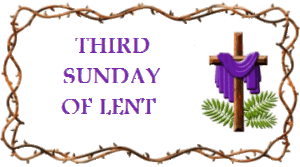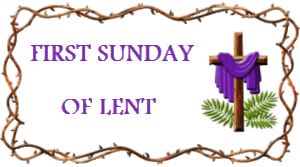Reflections: The Third Sunday of Lent
Gospel Reflection for the Third Sunday of Lent

The Gospel (4:5-42).
A spring of water welling up to eternal life.
This is a rather lengthy reading containing different themes. Central themes are the Samaritan woman, the well, and the water. In Jesus’ day, there was deep enmity between Jews and Samaritans, who were regarded by the Jews as heretics and not part of the Jewish people at all. This division seems to have had very old roots. There was enmity between the northern kingdom, Israel, with Samaria as its centre, and the southern kingdom of Judah. A noted well in the area was connected with the patriarch Jacob.
In the evangelist John’s writing, the episodes in this reading function at two levels – this earthly one, and at a spiritual level, to which the earthly ones point. Thus, the water from the well is a symbol of the water that Jesus will give his followers, welling up to eternal life; this is the gift of the Holy Spirit. The Samaritans worshipped at their own sacred site and the Jews at their Temple in Jerusalem, which led Jesus to speak of the coming age when both would be irrelevant, and God worshipped in Spirit and in truth. His own hunger gives Jesus an opportunity to speak of his intense desire, his hunger to complete the work the work the Father had given him, with the sowing of the Gospel seed and the ensuing harvest.
As a reflection on this reading, we can recall Jesus’ promise to give to those who believe in himself a spring of water welling up to eternal life – that is the gift of the Holy Spirit, who gives faith and hope, while Christian faith brings certainty.
A common feature of the world in which we live is doubt in matters relating to faith – doubt about elements of moral teaching, about truths of faith, and even at times about the very existence of God. An assertion of a certain philosophy, prevalent today, is that there is no certainty about anything. All we can have is speculation and guesswork rather than certainty, and opinions that vary from age to age.
An atmosphere of this sort adds to the difficulties of religious observance. Such doubt about fundamental matters is completely contrary to the teaching of the faith in matters relating to truths concerning this life and the life to come. Christian faith is thus described in the Epistle to the Hebrews (11:1): “Faith is the assurance of things hoped for, the conviction of things unseen”. Two of the terms used there call for our reflection: assurance and conviction.
The assurance and conviction spoken of in this verse are not psychological attitudes of souls rooted in the human mind or soul. They refer instead to the divine, theological, virtue of faith – a gift from God that gives conviction which is beyond that which human nature can provide. This assurance and certainty bring with them a peace of soul, the peace which Jesus has granted to believers, and a peace that no-one can take from them.

